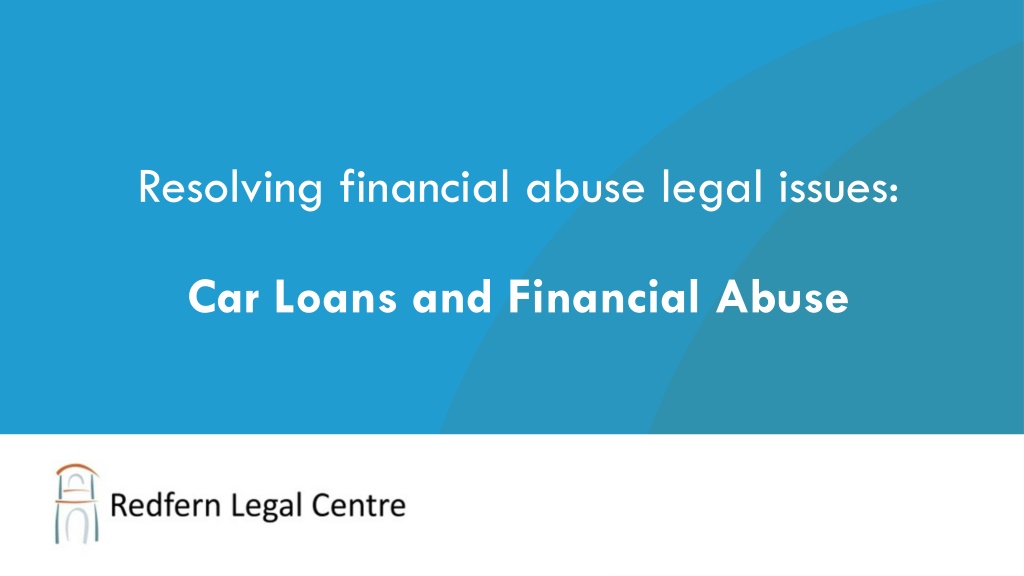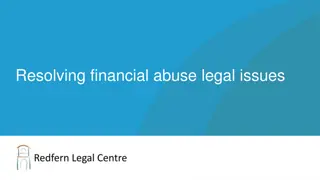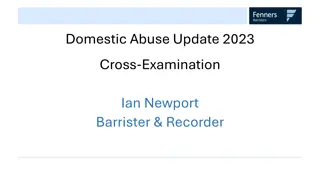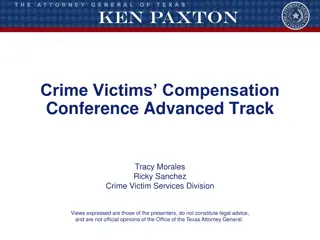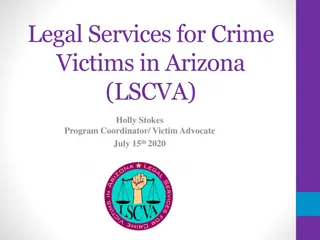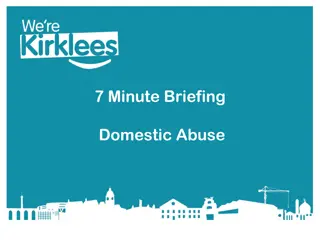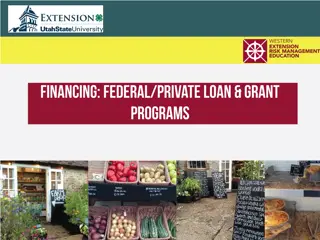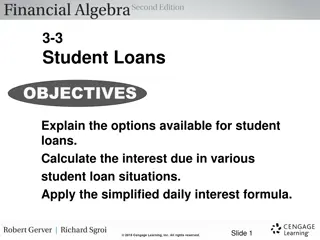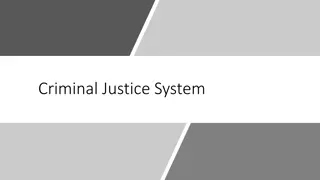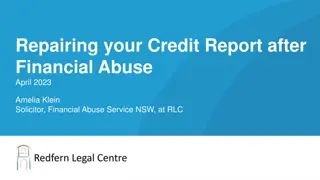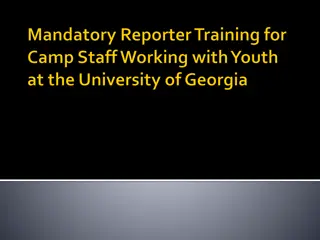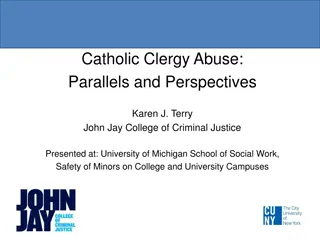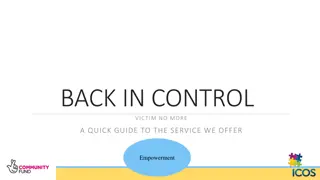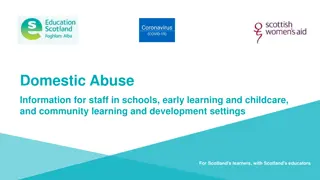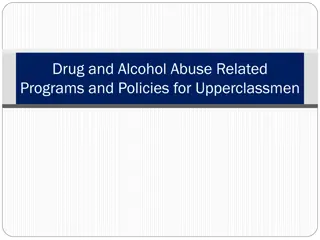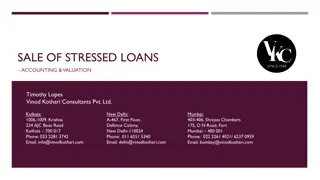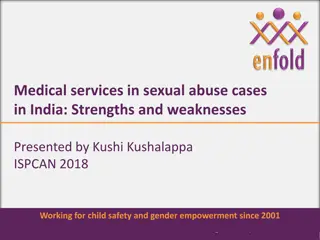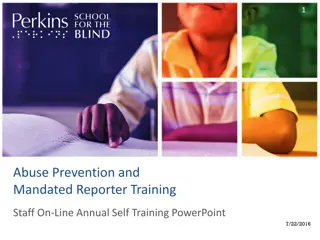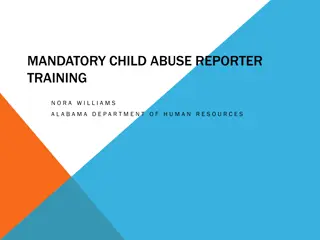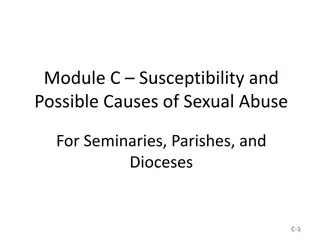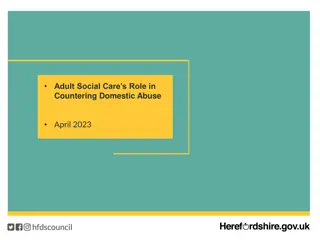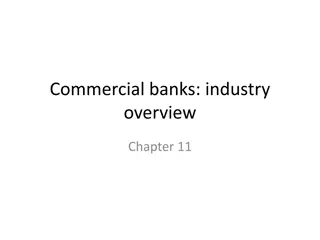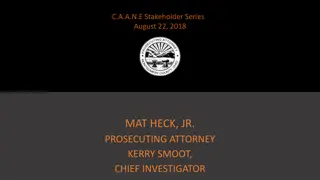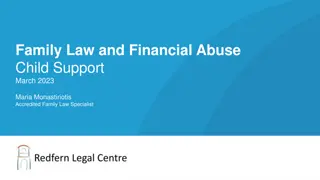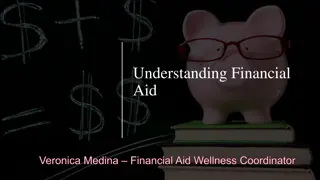Resolving Financial Abuse Legal Issues: Car Loans and Strategies for Victims
Explore the intersection of car loans and financial abuse in addressing legal matters, family law options, dealing with lenders and authorities, and seeking resolution. Understand the impacts of financial abuse and learn strategies to navigate complex situations. Access resources and guidance to empower victims and survivors of financial control and coercion.
Download Presentation

Please find below an Image/Link to download the presentation.
The content on the website is provided AS IS for your information and personal use only. It may not be sold, licensed, or shared on other websites without obtaining consent from the author. Download presentation by click this link. If you encounter any issues during the download, it is possible that the publisher has removed the file from their server.
E N D
Presentation Transcript
Resolving financial abuse legal issues: Car Loans and Financial Abuse
Rebecca Campbell Solicitor Financial Abuse Service NSW Redfern Legal Centre
Acknowledgement Of Country
Outline of todays webinar 1. Overview of car loans and financial abuse 2. Family law options 3. Consumer loans and business loans 4. Dealing with RMS and the dealership 5. Fines and tolls 6. Questions and further resources RESOURCES: www.rlc.org.au/training/resources/financial-abuse
What is financial abuse? Financial or economic abuse is a form of domestic violence where an abuser uses money as a means to gain power and to control their partner. Domestic violence is a pattern of abusive behaviour in an intimate relationship or other type of family relationship where one person assumes a position of power over another and causes fear It is often referred to as a pattern of coercion and control. (1800RESPECT) There is no single agreed legal definition of domestic violence in Australia.
Car loans and financial abuse Why focus on car loans? Car loans as a tool of abuse Safety concerns and AVOs
Car loans and financial abuse (cont.) Choosing a strategy: Will there be a property settlement? Who has possession? Whose name is the loan in? Whose name is the registration in? What outcome does the client want?
Family law: Mary and Bill Mary and Bill have been married for 10 years. Mary was a stay at home mum and Bill worked full time. Bill took care of all the money, including money Mary inherited from her parents. Bill bought Mary a car so she could take care of the kids, who are all under ten. Mary uses this car to take the kids to school, go grocery shopping, and attend regular specialist appointments for a health condition. Bill left Mary and is refusing to support her and the kids financially. Mary does not know what happened to her inheritance. She has never had her own bank account. Bill has stopped paying the car payments and so Mary is getting angry letters from the lender.
Family law options Interim orders Final orders When will this be the best path? Challenges
3. Consumer loans & business loans
Consumer loan: Reese and Nic Reese and Nic were in a relationship for 2 years. Reese wanted a new car and pressured Nic into taking out a car loan. Nic is a student and is on Centrelink. Nic was working part time when the loan was taken out, but Reese lied on the application form and said Nic was working full time. Nic and Reese both went to the dealership, but Reese did all the talking. Nic has left Reese. Reese still has the car and Nic is struggling to make repayments.
Responsible lending Credit providers must: Make reasonable enquiries about the consumer s financial situation; Make reasonable enquiries about the consumer s requirements and objectives in seeking the loan; and Take reasonable steps to verify the consumer s financial situation. 6 year time limit Remedy: waiver of interest, fees and charges Can use in conjunction with other arguments
Lack of benefit AFCA s approach to joint facilities and family violence: The lender should take steps to identify red flags of undue influence and financial abuse at the time of lending A waiver may be appropriate if the lender failed to act on red flags
Lack of benefit (cont.) Section 54 Banking Code of Practice: A person should not be made a co-borrower if they do not stand to benefit from the loan, unless the lender has made sure they understand the risks and are not experiencing financial abuse Responsible lending: If a person does not stand to benefit from a loan, arguably the loan is unsuitable
Strategic defaulting Failing to make payment and assisting the lender to repossess the car Often in conjunction with a request for the remainder to be waived May be appropriate if: Your client cannot afford the car going forward Your client s ex-partner has possession of the car
Hardship Hardship as an interim step Hardship as a final resolution May be used in conjunction with other arguments, including strategic defaulting
Unjustness Section 76 of the National Credit Code allows a court to reopen unjust contracts: S76 (2)(j) whether unfair pressure was placed on OC S76(2)(l) whether the loan was affordable S76(2)(d) whether borrower could negotiate S76(2)(i) whether terms were explained to borrower s76(2)(o) whether interest is unfairly high Time limit: 2 years from the end of the contract Remedy: Borrower put back in the position they would have been in but for the contract
Australian Financial Complaints Authority (AFCA) If negotiating with the lender through their Internal Dispute Resolution scheme doesn t resolve the matter, it can be escalated to AFCA 2 years to lodge in AFCA from the date of the final IDR response Lodging in AFCA will put the matter on hold, even if a statement of claim has been filed AFCA can t hear a dispute if there's a court judgement
Local Court Recovering money from an ex-partner When a lender has initiated proceedings Default judgments and set-asides
Business loan: Chris and Jordan Chris and Jordan have just separated. Jordan had a string of failed businesses and a poor credit rating so Jordan pressured Chris into taking out a car loan. Jordan pressured Chris into getting an ABN so they could take advantage of a deal for small business owners. The loan and registration are in Chris name but Jordan is the only one who ever drove the car. Jordan promised to pay the loan in writing, but never did. Chris has put a lot of money towards the car.
Business loan: Chris and Jordan Consumer Law does not apply The ASIC Act unconscionable conduct General contract law principles
4. Dealing with the RMS and the dealership
Rego: Sam and Alex Sam and Alex have been in a relationship for 5 years. During the relationship, Sam needed a new car and went to the dealership along with Alex. Sam chose the car and signed the loan paperwork, however Alex ended up on the registration. Sam has left Alex due to financial abuse and domestic violence. Sam has an AVO against Alex. The registration needs to be renewed soon and Sam keeps asking Alex to pay it, but Alex hasn t replied. Sam really needs the car to get to work.
Dealing with the RMS Notice of disposal Stamp duty Family court
Dealing with the dealership Part 7 of the National Credit Code: Related Sales Contracts Lender can generally be held responsible for breaches of the dealer: Responsible lending Missed red flags Failure to explain the loan
Fines and tolls If your client s ex-partner is driving a car registered in your client s name, you can dispute any fines and tolls they accrue Safety concerns Withdrawal vs nomination
6. Questions and further resources Rebecca Campbell Financial Abuse Service NSW Redfern Legal Centre RESOURCES: www.rlc.org.au/training/resources/financial-abuse
How to contact RLCs Financial Abuse Service NSW *** NSW clients only *** 1. Call us: 0481 730 344 2. Email us: falsintake@rlc.org.au 3. Complete our online form: https://rlc.org.au/fals
Before You Go Your feedback helps us improve our training. Please stay with us for another 60 seconds Training: rlc.org.au/training Enquiries: Nick Manning education@rlc.org.au This workshop is a guide to the law in Australia. It is not a substitute for legal advice. If you have a legal problem, seek legal advice from a legal centre or Legal Aid.
